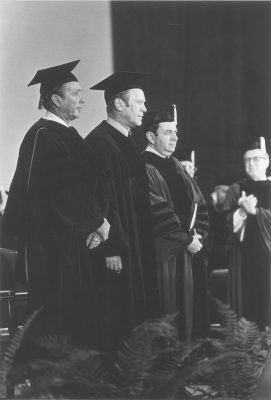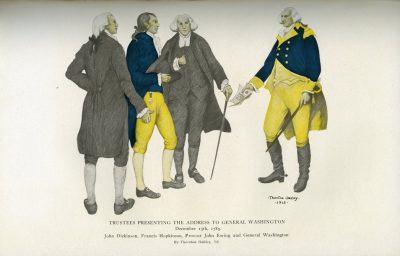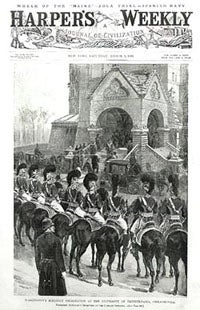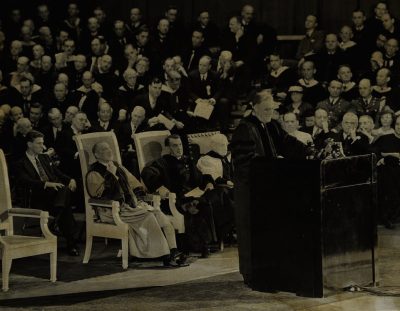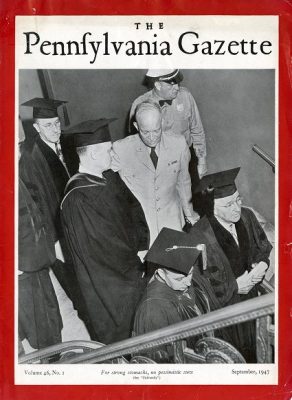| In May 1998, as I sat in the Commencement Day audience at Franklin Field and watched the graduating classes respond enthusiastically to President Jimmy Carter’s keynote address, my thoughts turned to the significance of Penn in American history and the regularity of Presidential visits to our campus. I knew that in October 1996 President Clinton had turned Hill House Field into a campaign rally stop and that in May 1975, while he was in office, President Ford had been Commencement Speaker. In addition to visits by sitting Presidents, I knew also that the University had often hosted American Presidents both before and after their respective terms of office. President Reagan had delivered the first of three Plenary Session addresses at the University’s 250th Anniversary celebration in May 1990 and Ford had visited campus in September 1984, to speak at dedication ceremonies for the Thomas S. Gates, Jr. Room in the Van Pelt-Dietrich Library Center. | |
| In recent years the visits of Presidential wives had also taken on historical significance. Hillary Rodham Clinton was Commencement Speaker in 1993 and recipient of the Trustees Council of Penn Women’s Beacon Award at an Annenberg Center ceremony in October 1997. Barbara Bush was Commencement Speaker in May 1990, just three days before Nancy Reagan accompanied her husband to campus. It was Mrs. Bush who, in the closing line of her address, had the best one-liner: “Somewhere out in the audience today there may be a future President of the United States. I wish her well.” Over the past quarter century, the University has conferred honorary doctorates on Mrs. Clinton, Mrs. Bush, President Carter, and President Ford. | |
| A careful study of Penn’s history shows that a total of eighteen — nearly half — American Presidents have visited the University sometime in their lives. Seven sitting Presidents have been guests on campus and two more Presidents-elect. The University has conferred honorary degrees on ten Presidents. The tradition begins, of course, with George Washington, who attended a reception of the Trustees and Faculty in April 1789, soon after his inauguration. Eighteen months later he was back on campus, with his Vice President and successor, John Adams, both of whom were in the audience for the first of Professor (and U.S. Supreme Court Associate Justice) James Wilson’s law lectures. Both Washington and John Adams had attended the College of Philadelphia’s 1775 Commencement while delegates to the Continental Congress and eight years later the University conferred an honorary Doctor of Laws degree upon Washington for his leadership of the American forces in the Revolutionary War. | |
| While he was sitting President, Thomas Jefferson sent his nephews to Penn and it is hard to believe that he never set foot on campus, but we have no evidence of such a visit and cannot claim that he paid a Presidential visit to Penn. It was in this same early national period that the first President to attend Penn as a student was on campus, but while William Henry Harrison enrolled in the Medical Department in 1791 his stay was brief and unsuccessful. Within four months he left campus and went on to earn military fame under Pennsylvania’s “Mad” Anthony Wayne. | |
| It was after the move of the Federal government to Washington, D.C. in 1800 that Penn’s prominence in the eyes of U.S. Presidents entered into a long period of decline. It is not surprising that this period coincided with Penn’s own difficult years. The College ceased being a school which attracted students from outside the Philadelphia area and while the Medical Department grew into a great national institution, the Civil War robbed it of more than half its students. Not until November 1881 did a U.S. President return to Penn. | |
| Under the provostships of William Pepper, Jr. M.D. and Charles Custis Harrison, Penn staged a tremendous comeback. President-elect James Abram Garfield spoke and accepted an honorary doctorate on February 22, 1881; President Grover Cleveland attended ceremonies at the Academy of Music as Provost Pepper’s guest in September 1887 on the centennial of the signing of the U.S. Constitution; President William McKinley was Provost Harrison’s house guest in February 1898, when he was the speaker at the University Day ceremonies commemorating the anniversary of Washington’s Birthday; Vice President Theodore Roosevelt was Provost Harrison’s guest at Franklin Field in November 1901 at that year’s Army – Navy game and while President, in February 1905, he returned to speak at University Day and accept the University’s honorary doctorate; in February 1902, while he was Governor of the Philippine Islands, William Howard Taft was the University Day orator and the recipient of an honorary doctorate; seven years later, as President-elect he returned to Penn and was again the University Day speaker. Penn’s University Day exercises featured academic, as well as political leaders. In February 1903, Penn honored Woodrow Wilson, then in his first year as President of Princeton University, as keynote speaker and the recipient of an honorary doctorate. | |
| After the visits of Presidents Roosevelt and Taft in 1905 and 1909, no sitting President returned to Penn until the University’s Bicentennial Celebration in 1940. At University Day exercises in February 1917, Herbert Clark Hoover, then the director of the Commission for Relief in Belgium, did not speak, but was one of three honorary degree recipients. He returned during the week-long University Bicentennial celebration in September 1940 and received a second honorary doctorate, but the guest of greatest honor, of course, was the President of the United States, Franklin Delano Roosevelt, who was the principal Bicentennial speaker and upon whom the University granted an honorary doctor of laws. Some of the alumni’s Old Guard may have been in attendance on that occasion. | |
| In the period following World War II, the University hosted General Dwight David Eisenhower, U.S. Senator John Fitzgerald Kennedy, and President Harry S. Truman, but none of them during the period of their service as President. Eisenhower accepted the University’s honorary doctor of laws at the Commencement of June 1947, while he was General of the Armies, Chief of Staff of the United States Army. With his eye no doubt already on the Presidency, Kennedy delivered the Crawley Memorial Lecture to a standing-room-only crowd of 2,500 at Irvine Auditorium in November 1957 and titled his address, “The New Dimensions of American Foreign Policy.” Three years later, in October 1960, when Kennedy was indeed the Democrats’ nominee, President Truman spoke on his behalf at a campaign rally at Irvine Auditorium. The 1960s were not good years for appreciative audiences on college and university campuses and the record of Presidential visits at Penn is silent again until the Commencement of 1975. |
Presidential Visits to the University of Pennsylvania
This exhibit was originally created in 1999 by University Archives and Records Center Director Mark Frazier Lloyd and updated

